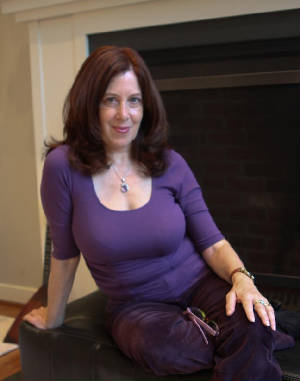
|
| That's me, Pattie Weiss Levy. |
A Modern-Day "Ima" on a Modern-Day Bimah
(With
new content posted every WEEK!)

|
|
Wednesday, April 27, 2011
A Word From the Weiss
While I sit here writing this on Tuesday, the eighth
and final day of Passover -- counting down the hours until sundown, when I’m free to sink my teeth into an avidly relished
slice of bread -- it occurs to me that almost everyone around me is in countdown mode as well.
Judging from every form of media known to man, from
60 Minutes to CNN, the whole world is counting down until the Royal Wedding unites Britain’s Prince William
with Bucklebury’s Kate Middleton -- a mere commoner, however comely she may be – with less than two days to go.
A bit less publicly, my daughter has begun the final
countdown until she graduates from college and hopefully commences her own happily ever after – in just three and
a half weeks.
My son is similarly counting down the days until
the TV show at which he is obliged to work grueling hours wraps up shooting for its current season – in another month,
at most.
Meanwhile, I wait along with them all, with bated
breath and the highest of hopes, wondering what Kate will dare to wear, what Buckingham Palace will deign to serve, but mostly
what Act II holds for my offspring and for me – that is, what in the world comes next.
In terms of Passover, I’ve managed to hold out without a single bite of chametz -- bread, cake,
or other forbidden food – provided you’re willing to overlook last Saturday night, when we went out with friends
for Thai food and decided to all declare ourselves temporarily Sephardic, rendering us free to eat rice. (Another minor slipup
to be forgiven: On Monday night, I added a tablespoon of flour to thicken a pot of homemade cream of mushroom soup. I don’t
know why I feel compelled to broadcast so trivial a transgression, but now that I’ve come clean, I feel oh, so much
better.)
As for the so-called Wedding of the Century, I’d
like to say that I haven’t the slightest interest, and I couldn’t care one whit what the Royals
serve or what manner of frock Kate wears. I’d like to believe I’m above such trivialities and focused on what
really matters.
But once again, in the interests
of full disclosure, I must confess otherwise. The truth is that I’m probably just as much of a sucker for all this nuptial
nonsense as the next bloke… or more likely, the next lass.
Back in 1981, my eyes were not only among the 750
or so million pairs glued to the TV the day that poor Lady Di became Princess Diana, but I soon after chose an engagement
ring that was an (extremely) scaled-down version of hers, featuring a royal blue sapphire surrounded by a shining sea of diamonds.
(That one pictured to the left? Obviously hers, and now Kate's, not mine.)
No wonder I found myself watching a lengthy interview on Monday night on Access Hollywood, in which
Elizabeth Emanuel, the frighteningly mop-topped designer of Princess Diana’s fairy-tale-worthy wedding dress, speculated
on who her fashion successor might be. Of course I pretended to be reading all the while and managed to feign utterly believable
disdain… until my husband dared to try changing the channel.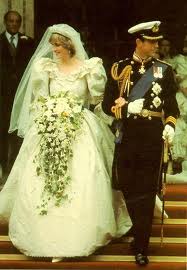
I must admit that I’ve also been looking up
recipes for scones, and will no doubt view all of Friday’s pageantry, albeit on DVR rather than my having to bound out
of bed by 4 a.m.
Does that make me a twit, or
even worse, a princess wannabe (preferably not of the JAP persuasion)? If so, then I’m not alone. Credentials have been
issued to more than 7,000 members of the press, who are already swarming like crazed bees around Buckingham Palace, competing
to cover this blessed event for countless media outlets worldwide.
Why
are we all so feverishly fascinated by a glimpse of royal regalia? Who knows? Of course, there’s the sheer, incomparable
pleasure of getting a vicarious thrill. Few of us ever taste more than an occasional tidbit of the glamour reserved for the
rich and famous, let alone the boundless freedom enjoyed by genuine royalty, whom we imagine to be too busy eating cucumber
sandwiches to be encumbered by unpaid bills, junk mail and having to floss their own teeth.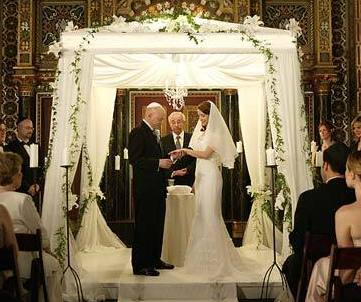
At the same time, wedding arrangements are real-life
stuff, a sort of common denominator that we commoners share on some level with these palace-dwellers, however blue their blood
may be. After all, most of us get married at some point in our lives, whether the ceremony takes place at Westminster Abbey
or Temple Beth Sholom… and whether the groom steps on the glass before an intimate gathering of dearly beloved or raises
his glass to an estimated audience of 2 billion gawkers, give or take.
Most
of us women would like to imagine ourselves, or perhaps our daughters or granddaughters, enrobed in exquisite royal finery,
getting hitched to an actual prince. The multi-tiered fruitcake they’ll be serving, I could take or leave. (I still
have a small boxed fruitcake from Harrod’s that some British friends brought me back in 2002 or so.) But who among us would object to a son-in-law who truly treats their daughter like a princess? But who among us would object to a son-in-law who truly treats their daughter like a princess?
Then again, few of us would envy certain other elements of Kate’s fate, which, like almost any marriage,
remains a mixed bag – a litany of highly intrusive in-laws, including caustic step-mum Camilla and dour Prince Donkey
Ears, literally destined to be royal pains; the invasive omnipresence of both the paparazzi and the public; and the need to
raise future offspring under the watchful and often disapproving eyes of all of the above.
Meanwhile, there remain the inevitable, real-life pressures of the Royal Wedding. No matter how grand the
proceedings may be, after the reception comes a lifetime of daily life. Having witnessed the train wreck of a marriage that
ensued following the last Wedding of the Century, no one can help placing bets on the prospects of this new royal alliance.
This brings to mind something bizarre that I observed
while taking a walk yesterday afternoon. As I passed a neighbor’s house, I saw a tiny animal traversing the lawn. At
first I thought it was a squirrel that might have lost its tail to a fleet-footed dog. Then I realized that, although it had
the torso and gray coloring of a squirrel, its tail was clearly a bunny’s. Also, it was hopping. This creature was neither
a squirrel nor a rabbit. It was decidedly a poorly conceived and oddly crossbred combination: a squir-rabbit. What could this
poor specimen’s interspecies progenitors possibly have been thinking?
Similarly, we’ve all seen pairs of people who
are joined in life, whether by love or marriage, but by all visible signs are so egregiously mismatched that we wonder inwardly,
as politically incorrect or snide as it might seem, “What could they possibly be thinking?” Yet this is far from
the case with the gorgeous, eminently photogenic royal couple-to-be. “Wills” may be descended from monarchs and
Kate from caterers, or even convicts, for all I care. To the naked eye, they’re like an elegant pair of salt and pepper
shakers: both tall, slender and invariably poised, with handsome features, flawless physiques, and impeccably fitted, tasteful
attire. Why, they even seem to walk in sync.
They
appear to be so well-matched that I misplace my cynicism just looking at them. Normally, I’m not one to anticipate a
fairy-tale ending, nor to believe that the average marriage stands more than a fighting chance in this complicated, conflict-ridden
world. (Indeed, a new survey out this morning indicates that one in four children in the U.S. are now being raised by a single
parent.) Yet how could this match not end reasonably happily ever after? They’re so clearly two of a kind.
I’m happy to say that I’m similarly inclined
toward a rare spirit of optimism about my daughter’s own impending walk down the aisle (the commencement aisle that
is). Given the many tasks that she needs to accomplish in the waning weeks of her education, all she can focus on now is how
impossible it appears that she’ll ever finish on time. All that I can do is keep advising her to just do her best
and assure her that it will all get done.
“Do
you lie awake at night worrying about your fourth-grade homework?” I asked her recently. “Well, believe it or
not, this stuff will also seem like ancient history soon.”
I'm proud
to say that she's just been chosen to sing during graduation, no small honor at NEC, her ultra-competitive music
conservatory.
Most anxiety-provoking to her, though, is an upcoming
performance known as the senior recital. It’s her school’s equivalent of the usual college senior thesis, a culmination
of her studies delivered in the form of a solo concert, in which she will perform many of her own compositions, along with
her original arrangements of assorted standard tunes.
She phones daily to fret about some technical difficulty
or other esoteric detail that threatens to undermine the quality of this event or keep it from ever being good enough. I simply
remind her that she is not appearing at Carnegie Hall or its jazz equivalent, The Blue Note (not yet, anyway), and that the
audience will consist mostly of her family, friends and professors, in whose mostly adoring eyes she can virtually do no wrong.
I also took her to Nordstrom the day before Passover
and bought her a gorgeous new gown. However she sings, the beading at that neckline is sure to dazzle everyone.
I’m far more anxious about the fact that she’s advertising on the invitations that the reception
after the concert will be “catered by NiceJewishMom.com.” Oh, the pressure! It’s enough to make me sympathize
ever so slightly with the chefs at Buckingham Palace. What in the world is both elegant and yet Jewish that I can possibly
serve? Not to mention that it’s set for mid-May and there’s no refrigeration available in the concert
hall. Creamed herring and kreplach are definitely out.
After it’s all over, what will my daughter
do next? So many people keep asking me this question that I can only imagine how inundated she feels with such queries. Yes,
given the dreadful state of the economy, the job market looks treacherous. It doesn’t help that her degree is in music,
and that, having majored in jazz vocal performance, she actually aspires to eventually make a living doing what she does best:
singing jazz.
In fact, she already has several singing engagements
booked for this summer. And although these may not initially pay the rent, let alone for her extensive wardrobe (like bonnie
Kate Middleton, she rarely goes out unprepared for an impromptu photo op), she has experience doing all sorts of work
and plans to seek some sort of day job.
And I have
full confidence that she’ll find one soon. Regardless of her youth and relative inexperience, she exudes two things
which seem to serve her well on job interviews (neither of which she inherited from me): an upbeat attitude and an outgoing,
winning personality (which has nothing whatsoever to do with “winning” á la Charlie Sheen). People who
interview her could care less if she knows Powerpoint or speaks fluent Chinese. They generally find her likable enough to
inquire about only one thing: how soon she can start work.
My son, being three years out of school, is on a
slightly higher plane in terms of personal evolution, but not that much higher on the totem pole. Aspiring to a creative career
himself – he aims to make a living as a TV writer, screenwriter, or other purveyor of the written word –
he was thrilled to find a job soon after graduating from Brown in 2008 as a production assistant at one of the few TV shows
that are shot in New York, Law & Order: Criminal Intent.
Three
years later, though, he’s still doing this, and most of the thrill is gone.
Although it may sound illustrious to be working in the entertainment field, and employed at a TV show that's
a household name, many aspects of his job are rather menial. It doesn’t help that it requires him to get up shortly
after 5 a.m. five mornings a week (sometimes even six, when they’re behind schedule) in order to be at work by 5:45
a.m. Young people rarely if ever go to bed early. He’s chronically beyond sleep deprived, not to mention often on the
crabby side. Clearly, his livelihood is making him anything but lively (in case you think that he comes by that Law &
Order scowl naturally).
Yes, he’s self-supporting.
He likes his boss. But he’s capable of doing so much more.
So it’s no surprise that he called me this
morning sounding none too upset that, although this season’s first episode has yet to air, the show’s begun its
final month of shooting. (Be sure to catch the season premiere this Sunday night, at 9 p.m. on the USA Network, featuring
the return of former co-stars Vincent D’Onofrio and Kathryn Erbe.)
Although the official web
site bills this as its tenth and final season, there remains some chance that the show will return. But even if it does,
my son remains conflicted about returning to it.
After the lofty, mind-expanding
experience of college, entering the job market tends to be too much of a humbling experience. Having once
faced similar hurdles as a young journalist myself, I know that it’s not easy getting onto the next rung up when you’re
in your early 20s in any field, let alone a creative one. Leaving would force him to face uncertainty, though. Then again,
it might free him to do more writing and compel him to find something more suited to his potential.
At the very least, having the season wrap up will allow him to catch up on his sleep.
Then he might find another, more challenging job. Or possibly go to grad school. Or do something else entirely.
“Four weeks, and then… who knows?” he noted to me this morning, sounding far more hopeful and relieved
than ridden with anxiety or dread.
“Who knows?” is a pretty fair way to
sum up the future for us all, I guess… although, as I often tell my son, when you’re 24, as he is, there’s
far more room for vast possibility and serendipitous opportunities than when you’re in your fifties, as I am.
Meanwhile, whatever lies in store for my eager offspring, their each being on the verge of a major transition
impacts my own identity, not to mention my future, as well.
Three
weeks from now, I will no longer have any children remaining in college. I will be the mother of two grown children who are
totally independent, or soon to be, and are making their own ways in the world. Yes, beyond the end of tuition bills, it’s
a relatively minor shift for me. But I will sorely miss visiting my daughter in Boston, getting to sit in on occasional
classes, and having ongoing ties to academia, however loose they may be.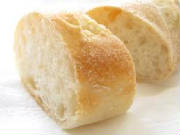
So this period also ushers in, subtly but certainly,
a new stage of life for me. One that might require making some new decisions and personal strides, or even seeking new opportunities
myself. I, too, could be on the verge of something new and different. Maybe not something royal, or particularly
monumental. But maybe something better.
Meanwhile, I have a hot date tonight with an English muffin, or maybe
a French baguette, and I’m eagerly counting down to it all. Then, as my son aptly said, who knows?
Wednesday, April 20, 2011
A
Word From the Weiss
On the third day of Passover, my true love said to me…
“Matzah and gefilte fish… again?!?!”
Just kidding. My husband would never say that. For one thing, he loves matzah, and virtually anything you can make with
it. Matzah balls, matzah brei. Ditto gefilte fish.
For another thing, I can hear him in the kitchen behind me right
now, and without even turning around, I can plainly hear that he is spreading butter. OK, maybe not butter. Margerine. Smart
Balance Light, to be exact. But whatever form of fat he may be employing, he’s clearly applying it, as I type these
words, onto a piece of toast.
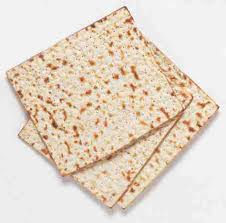 Yes, toast on Passover. I am talking
about toasted bread. (Does anyone actually toast matzah, which is pretty toasty already and has all those burnt-looking
ridges to prove it? Unless, of course, you’re making matzah pizza, my Passover lunch of choice.) Yes, toast on Passover. I am talking
about toasted bread. (Does anyone actually toast matzah, which is pretty toasty already and has all those burnt-looking
ridges to prove it? Unless, of course, you’re making matzah pizza, my Passover lunch of choice.)
Anyway, as I was saying, my husband
eats bread during Passover. Not to mention cake, pasta, and regular pizza, too. Then again, far be it from me to cast aspersions.
After all, it troubles me enough that, although Passover is among my favorite holidays, it somehow manages to become, like
most Jewish holidays and other religious celebrations, a bit of a competitive event.
Holidays, after all, are family-oriented
by nature, and families, mine included, tend to combine a wide range of both personality quirks and levels of religious observance.
So do even the best and longest of friendships. And whenever people get together as a sizable group, these fundamental differences
need to be accommodated in some way. Otherwise, all manner of conflict and chaos may erupt, as well as some real tears shed
along with all of those symbolic saltwater ones. And what kind of a celebration would that be?
As I mentioned last week, my family decided to do something a little unorthodox this year and hold our first
seder on Sunday night, rather than Monday, when the Feast of Matzah officially began. My children and my niece were unable
to join us during the week. And I would far prefer to be with them on the wrong night than celebrate without them on the right
one.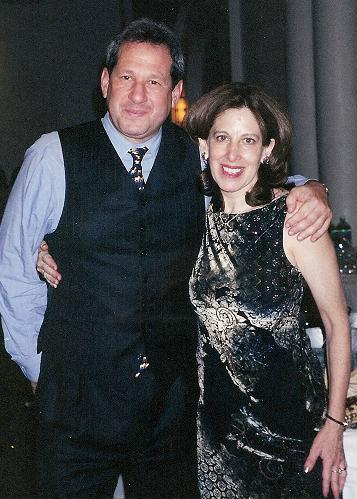
My brother and sister-in-law were more than happy to go along with that program, the better to avoid the
inevitable holiday Jew jams while driving to and from Long Island. In turn, I was inclined to try to accommodate my brother’s
personal preferences and personality quirks. My brother Joel, you see, according to the boasts of my late mother, was toilet
trained at the tender age of six months, if not right in the womb. He thrives on order and is meticulously punctual. Me?
Not so much. OK, not at all. I’m loose. I’m lax. I’m more of a free spirit. I’m more than a little
messy, and I’m almost always a little late.
Unfortunately, transforming a messy person’s home into a passably
tidy one is about as easy as losing weight overnight. You need to start early. But no matter how early I start, I soon realize
that it wasn’t early enough, and that my house will never be neat enough.
Couple that with all of the cooking
required to serve the many courses of the seder meal, and you will understand that, come April, I truly have my work cut out
for me.
Being an avid Jewish cook, I always prepare everything from scratch, with the exception of the gefilte fish
and the chocolate-dipped macaroons, excellent versions of which are readily available from our local Jewish supermarket, The
Crown. I also insist on preparing everything fresh at nearly the last minute, whereas most sane people start cooking weeks
in advance, even if it means risking serving brisket with freezer burn.
But the real reason I’m ready to collapse
by the time all of my guests arrive isn’t physical exhaustion. It’s anxiety. I’m riddled with fear that
my meal won’t be ready right on time, or that my brother will notice that my house is more than a tad disorganized.
This is one of the many reasons that I found myself barking at my daughter the night before everyone arrived, as delighted
as I was to have her home for Passover, and ordering her to move the copious clutter she’d carted home with her from
college. She stared at me in disbelief. “The people who are coming are just our family," she retorted. "They’re
the same people who come every year. What are you getting so worked up about?”
Perhaps she was right. After all these years,
maybe I should just say to my brother, “You’re neat. I’m not. At your house, things are clean and organized.
When we’re in my house, they won’t be.”
The problem is that, despite our differences, I want everyone to get along.
If my brother feels edgy in my house, we may not get along. Plus, he’s my older brother -- eminently positioned
to make me feel inferior -- and I’m convinced that he sees any evidence of disorganization as a clear sign of insanity.
And even though, much like Popeye, I yam what I yam, I don’t want him to know what I am, or to give him the
satisfaction of thinking I’m in any way inferior to him, let alone in any way mentally deranged. I would rather bend
myself into a pretzel – woops, make that an egg kichel – to prove that I’m just as neat, and just as normal.
To my delight, as well as his, I managed to not only have the table set and almost everything cooked by the time my
guests descended on us this year, but to be completely ready for everyone to sit down at precisely 5 p.m., just as promised.
My brother, in turn, who remains mystified about how and when I became "so Jewish," then put up with my
family’s inclination to read through a substantial portion of the Haggadah.
And to my (somewhat free-spirited)
eye, that is what celebrating Passover ultimately is all about: a series of strategic negotiations and conflict resolutions
no less delicate and heated than the one once waged between Moses and Pharoah, as people jockey to accommodate one another’s
quirks, proclivities, and levels of religious observance (or lack thereof).
For example, on their way to a second seder on Monday night, my brother’s wife, who is not Jewish,
confessed to him that she was extremely tired from having worked that day and having already gone through much of the Haggadah
at our house the night before. She was not really in the mood for an instant replay. So, being a lawyer, and not-so-secretly
sharing her preference to dispense with the religious rituals himself, my brother made a motion at his host’s
house to waive the Haggadah reading and just chow down.
Being a judge, his host promptly responded, “Motion denied.
Any other motions?"
Then they proceeded to read through the entire lengthy service all over again, Four Questions, ten plagues and all. So much
for negotiation, although the conflict was indeed resolved.
Meanwhile, on Monday afternoon, I stopped in to chat briefly with
a friend whose house we were invited to for Tuesday night. I had an enormous amount of food left over from our seder and wanted
to know what I could bring to hers. She told me that she’d heard from her husband that I’d already offered to
supply homemade matzah ball soup. She looked horrified.
“You can’t bring your matzah balls into my house,”
she said flatly.
While stating this, she was pouring boxes of matzah ball mix into a bowl. Not to cast any aspersions, but I make my soup from
scratch using kosher pullets, and I make my matzah balls using my great grandmother Bubbe Chaia’s recipe.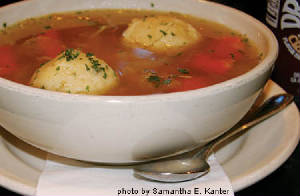
The problem wasn’t my recipe, though, nor how good or kosher any of it was. It was more fundamental
than that. My friend gestured toward her kitchen counters, which were covered with paper. “Do you change your house
over for Passover?” she asked with obvious skepticism.
This is something people ask me repeatedly around
this time of year. By this, they mean not only whether I banish chametz – all bread, cookies, cake, and pasta,
as well as rice, corn, and all the other foods verboten during the holiday – but also whether I switch to special dishes,
utensils and cookware reserved strictly for use during Pesach. Something that my friend, who happens to keep kosher year-round,
does herself.
The answer is that I don’t, in large part because I can’t. My husband, you see, although he also
was born and raised Jewish, doesn’t choose to keep Passover, beyond attending seder meals on the first two nights. And
although I might prefer that he match my own decidedly moderate level of observance, I believe that I have no right to impose
my preferences on him, any more than he’d have a right to insist that I eat toast with him.
Also, who am I to sneer at him
or to say, “My way or the chai way?” The fact is that I didn’t grow up keeping Passover for all
eight days myself. My family never had special Passover dishes, flatware, or pots and pans. Why, I didn’t
even learn that you’re supposed to sell your chametz to a Gentile until our kids entered a Jewish day school. (That's
when I became "so Jewish.")
When our kids were still living at home, I’d go to the exhaustive
effort of removing everything we weren’t supposed to eat from the cabinets and fridge. This not only meant respecting
the holiday, but also preventing anyone from accidentally popping a Lorna Doone or something else tasty but taboo. But now
that there are only the two of us, I save myself the trouble and just try to be vigilant.
So now I realized that I’d
have to keep the gallon of chicken soup I’d made, along with my fluffy matzah balls, to myself. I asked my friend what
I could bring instead. (I’m a nice Jewish mom; I can’t go to someone’s house empty-handed.) The answer was
that I couldn’t bring anything of any kind that I had prepared in my home. All that would be acceptable to her level
of observance was that I bring ingredients for a green salad, provided that they remain in their original store packaging
and that I assemble them in her home… making sure not to include any cheese in the salad or dressing, since the rest
of her meal was going to be fleischedich. (That is, she was serving meat, whereas cheese is a dairy product, and
in a kosher home never the twain shall meet.)
Of course I was a bit disappointed. But I yam what I yam, and
she is what she is, and particularly on Passover, that's the only possible way the twain could meet.
Later that night, my family and
I went to a seder at yet another friend's house. And I do mean later. One of these people’s sons has recently
chosen to become extremely religiously observant. He's entered a Yeshiva in Israel, but was home for Passover and insisted
on going to temple before the seder and then not walking back until after the sun had set. He had requested that the
seder not start until he returned.
The only problem with this was that these people have two other sons,
both of whom were driving 100 miles back to their homes in Boston after the meal, along with their respective wives…
and my daughter, who was returning to college there.
Counting extended family and friends, there were 16 people attending
that seder. Only one of the 16 was that observant. But in order to accommodate his preferences, none of us could begin
wending our way through the Haggadah until around 8:15.
That didn’t dissuade a second of these people’s
son, who was conducting the service, from leading us through prayers and songs for well over an hour. When the actual
meal finally commenced, another tense negotiation arose. These people have yet a third son, who makes little attempt to disguise
some lingering friction with his mother. When the first course was about to be served, the mother made a brief announcement.
The seder meal has so many courses, and there were so many guests, that she was going to need some help. Her tradition
was that she would assign each of the women at the table a number, and when their number was called, they would help
serve or clear. The third son instantly bristled at the mere mention of this plan. He took vociferous exception to it on two
counts -- the concept of recruiting women only and the choice to call them by number.
My friend staunchly stood her ground,
though, reluctant to change her ways. The son looked apoplectic, and an awkward battle ensued.
“Would anyone here rather
be called by name than number?” my friend reluctantly asked. I wondered what to do to defuse the tension. Dare I raise
my hand and defy her too?
Meanwhile, the irate son continued taunting her. “What’s wrong with
numbers, Mom?” he demanded. “Just think of the last time Jews were assigned numbers!"
Fortunately, I was seated
next to my friend and could whisper fairly discreetly. “You’re clearly upsetting him,” I said under my breath.
“Why don’t you just drop it?”
“Because it’s our tradition,” she whispered back.
“We’ve always done it that way.”
“Well, it clearly offends him. So maybe it’s time for
a new tradition,” I replied.
“Fine,” she announced to everyone. “Mary! Allegra! Please
serve the gefilte fish!”
Another family scene circumvented. Another Passover disaster passed over.
No, it wasn’t exactly the
parting of the Red Sea. And in the end, I could probably use a little coaching on negotiations with my own sometimes-testy
son, who I have my own tendency to inadvertently provoke.
This actually happened the next morning, when I awakened late to
a call from him. The Boston contingent from Monday night's seder hadn’t taken off until well past 11 p.m. And being
a Jewish mother, and given the amount of Manischewitz I knew they’d consumed, I hadn’t been able to go to
sleep until I’d received a call from my daughter at 1:16 a.m., assuring me that she had indeed arrived home safely…
and that she had managed to put all of the home-cooked Passover supplies I’d sent back with her safely into the fridge.
So I grew a little distraught when my son called to tell me of his own Passover experience. He noted that he had
ended up holding an impromptu seder in his apartment the night before. Having no other offers, he’d invited
over a Jewish boy and girl he knew who also had no plans, and they had improvised a meal.
“Why didn’t you tell
me you were having a seder?” I cried. “I sent so much food home with your sister. Now I feel terrible. All I gave
you was some matzah ball soup and a box of macaroons.”
“Mom, calm down!” he scolded me.
“I was fine. Seriously. We had more than enough to eat."
"But
-- "
"Mom! Had you only sent me back with the macaroons, it would have sufficed
us. Had you only sent me back with the matzah ball soup and the macaroons, it would have sufficed us!”
Dayenu, as they say. But that didn't suffice me.
“But... I had so much brisket that I could
have given you. Potatoes. Vegetables. Gefilte fish. Did you have to cook after work? What did you do for the main course?”
Thus sayeth the Wise Son: “No problem! I picked it all up from Boston Market.”
Oh! OK. It may not be kosher. It
may not be my tradition. But my son likes to be independent and to do things his way. It was also
fine for his level of religious observance, and it worked. And if he ever invites me for Pesach, I’ll gladly eat it.
Who knows? I'm open to negotiation. Maybe it could become a new family tradition.
Wednesday, April 13, 2011
A Word From the Weiss
Passover is all about celebrating freedom and remembering to count our blessings,
using all sorts of edible and visual aids – from the saltwater in which we dip to the reclining position in which we
dine -- to remind us of our people's painful past.
Or is it?
It seems like all sorts of
things are conspiring this year to give Passover a makeover, or at least to offer the world in general, and me in particular,
a fresh perspective on it.
I’m not just talking about the many plagues that seem to be cropping up worldwide, from the earthquakes and aftershocks
that continue to wrack Japan to the narrowly averted catastrophe last week in which our national government nearly came to
a disgraceful screeching halt.
I’m referring, for starters, to the most
basic pillar of Passover known to mankind, or to the American Jew, anyway: The Maxwell House Haggadah.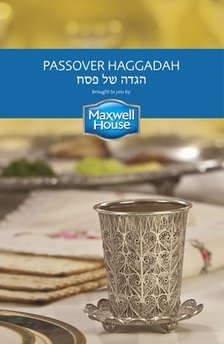
As I read in The New York Times last week, this venerable publication, distributed annually in supermarkets
by the popular coffee company, has just been given an overhaul. Although Maxwell House (now a subsidiary of Kraft) has continued
to distribute its holiday books free of charge to anyone who purchases a can of its coffee, the company has used the
exact same translation for nearly 80 years. It hasn’t changed so much as a comma, let alone a comment from Rabbi Akiba,
since its first edition, created as a marketing ploy back in 1932. Until now.
The new version
has updated the English translation to make it more in keeping with modern lexicon. Never fear – Moses doesn’t
organize the mass exodus from Egypt via Facebook now, nor does he threaten Pharoah with all manner of plagues using gmail
or Skype. All those stodgy, Shakespearean “thees” and “thous” of yesteryear, though, have gone the
way of the Sony Walkman, supplanted by far more conversational pronouns like “you.”
References to God as male also have been replaced by gender-neutral language.
“Blessed art thou, Oh Eternal, King of the Universe,” for example, has given way to far less stilted and sexist
phrasing: “Blessed are you, our God, Monarch of the Universe.”
How do I feel about these changes?
Certainly, I’m in favor of making ancient
rituals more accessible to new generations, and anything else that helps dust off our illustrious history and usher it into
the current millennium. (That’s one of the many reasons the lyrics I write for Purim each year are peppered with
references to iPads and Katy Perry, or whoever the latest cultural icon happens to be.)
So
it seems prudent and preferable that the Four Questions, which used to begin with the impenetrable words, “Wherefore
is this night distinguished from all other nights?” have been translated into actual people-speak. “Why is this
night different from all other nights?”
I’ve also never been comfortable
with the image of God as a patriarch, so I once took delight in unnerving my father at the seder each year by inserting my
own feminist bias: “Blessed be He (or She) Who keeps His (or Her) promise unto Israel, blessed be He (or She).”
Never mind that by this point in the service, everyone would be so eager to get through the prayers and eat matzah ball soup
that by dragging things out like that, I probably risked death by friendly fire.
Then again, I’m not sure I’m ready for the parable of the Four Sons (one wise, one wicked, one simple,
and the one who hath no capacity to ask) to be recast as four children. Granted, I was an avid Hillary supporter, and I prefer
that virtually everything be gender inclusive. But the Simple Child? That just doesn’t roll off the tongue
in quite the same way. So I guess, for sentimental reasons alone, I’d prefer most of the parlance of Pesach
to remain pretty much as is.
I also can’t quite imagine a girl having
no capacity to ask.
Besides, I don’t need a hip new Haggadah to make the story
of Passover appear au courant. In the past week or so, I’ve had a series of personal experiences that have
helped make the holiday seem very real and extremely up-to-date to me.
It all began
last Monday night, when I abruptly developed a tickle in my throat. Seasonal allergies precipitated by a spring rain? Or too
many nights spent at the Greater Hartford Jewish Film Festival, jammed in with hordes of hacking and coughing, culturally
active Jews?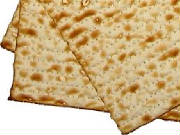
God knows. All I know is that I too was soon coughing constantly and congested enough to easily persuade my doctor
to give me an antibiotic. He prescribed Levaquin, which quickly proved to be worse than my original malady, having adverse
side effects equivalent to half a dozen plagues, ranging from sleeplessness, severe exhaustion, a sour taste in my mouth, loss of appetite and light-headedness to extreme
constipation. (Just imagine: Not a single bite of matzah yet, and I’m already totally plugged up!)
I needed to take it, though, because my husband and I were going to New York for the weekend, having purchased tickets
to “The Whipping Man,” a play with strong Jewish content recommended by close friends who are such avid theater-goers
that I am tempted to term them culturally hyper-active Jews.
Meanwhile,
I was subjected to yet a seventh plague. A loud, extremely lively squirrel moved into our attic and began scampering around
directly above our bedroom, keeping us up half the night throughout the week. (Wild beasts, anyone? How about vermin?)
Anyway,
we arrived in New York the afternoon of the play and met up with our son, Aidan, who had agreed to join us for the performance.
The weather was so beautiful that we decided to spend a couple of hours at a nearby street fair. Following a week of insomnia
and that evil antibiotic, though, I was really dragging. By the time we had walked the length of the fair and back, I found
myself ready to collapse.
If that’s how I felt strolling for a mile or two on a temperate afternoon in Manhattan, I thought, how would
I ever have endured wandering for 40 years in the desert?
I announced that I needed a cup of tea and a small
snack pronto. En route to find one, though, my son suddenly ducked into a shop we passed that carried Apple products. He'd
recently gotten an iPhone and wanted to buy a case for it.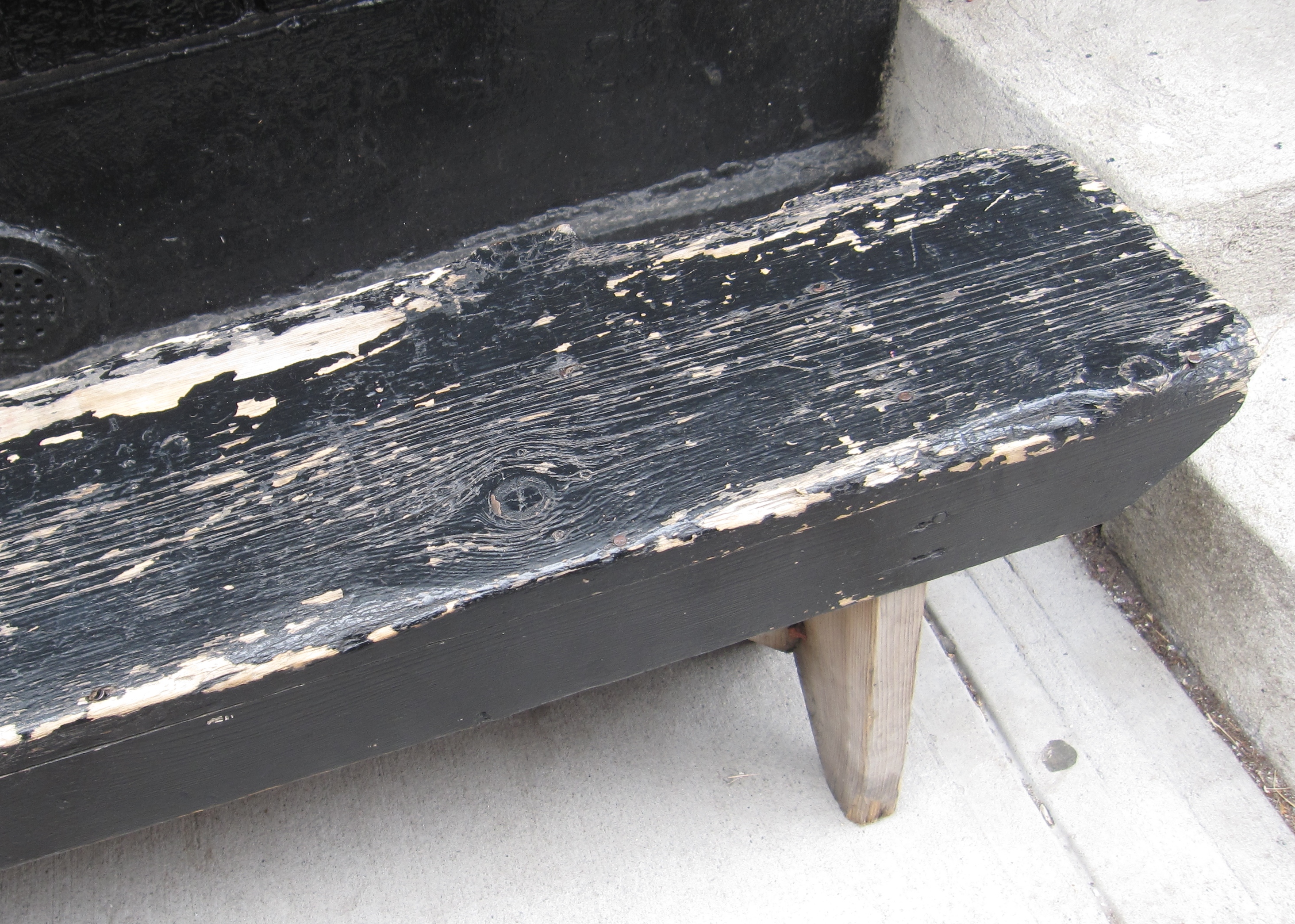
While waiting, I decided to take a seat on a bench I noticed just inside the entrance. This was a particularly
ancient and decrepit wooden bench, and as I settled onto it I felt something strange. It was as though a button had been torn
off the back of my trousers.
There was no button on the back of my trousers, however. But when I reached down, it felt like
there was a button on the back of my trousers. Groping around further, I realized that the “button” was,
in fact, a large, raised welt. Could this be… boils?
No way! Rather,
an enormous splinter of pressure-treated wood had broken off the bench, pierced through both my favorite black trousers and
my underpants and lodged itself deep into my backside.
Gripping the splinter firmly, I yanked it out as
best I could, as painful as this was. Fortunately, our son returned moments later, and we quickly proceeded to a nearby bagel
shop. At this point, though, my husband began to fret relentlessly that I might not have managed to extricate the entire splinter.
What if some portion of it remained in my backside and soon became infected?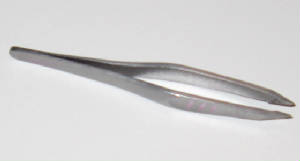
It was at this moment that he revealed something unbeknownst to my son and me. Something very strange. While we’d
been at the street fair, he had wandered off briefly by himself and made a small purchase. The thing that he had purchased
was a large pair of tweezers. He hadn’t really needed tweezers. He had plenty of tweezers already. He’d just bought
them on impulse.
Or had he? Maybe it wasn’t exactly the parting of the Red Sea. But it seemed like a small modern miracle. Or
let’s just say that sometimes, perhaps, God may work in mysterious ways.
As it happened,
the restroom in this deli-like establishment was a single-room, unisex facility. My husband wanted me to join him there
so he could examine the, er, situation. The restroom was located right in front of the counter, however, in plain
sight of the entire staff and the many customers who happened to be waiting there. An argument soon ensued between us. He
thought that we should walk right in together. I thought that would look decidedly skeevy.
Our son
proposed a compromise. “Why don’t you do what we did in college?” he asked. “One of you goes in, then
a couple of minutes later, the other slips in too.”
I wasn’t sure what he and this second hypothetical
person would then have proceeded to do together back in college. But this sounded like a more discreet approach, so I
readily agreed.
Unfortunately, about a minute after I joined my husband inside, a man began banging on the door persistently
because he needed to use the facilities. Also unfortunately, my husband soon discerned that a sizable sliver of
wood remained embedded in my bottom.
Despite the promised proficiency of the tweezers, he could not
seem to get a good grasp of this wood, which was barely protruding from the skin. He continued probing vigorously. I continued
howling with pain. Meanwhile, the man continued pounding on the door, demanding entry. I kept insisting that we give up and
go back to our hotel to complete this delicate procedure. But my husband remained convinced that he was on the verge
of getting the wood out. He refused to stop.
Finally, after what
felt like an eternity, he achieved success, causing me to let out one last shriek. Then I swiveled around to check myself
out in the mirror and observed a ninth plague gushing out of my backside. Blood!
As much as I detest
clichés, I must admit that I often employ one in particular. I am forever noting that I needed something unpleasant
that has happened to me “like I needed a hole in the head.” What I recognized now was the one thing that I truly
hadn’t needed: an extra hole in my butt.
Meanwhile, I also realized that we now had to exit the facilities in tandem in front of a small crowd. And based on
the length of time we’d been in there together and the amount of moaning and shrieking I’d done, they might imagine
we had been up to some other sort of Biblical activity involving a very different kind of wood. When we emerged to find
that the fellow who’d been banging on the door was a religious man dressed in a caftan and fringed prayer shawl, I felt
obliged to tell everyone the story. My husband pronounced me crazy. (Not another plague. Just business as usual.)
I’m not sure anyone believed me or even cared.
It wasn’t easy sitting through the play that night under the circumstances, although not for lack of quality
or interest. I don’t want to tell you too much about this production, considering that it closed the next day, as scheduled,
after having been extended repeatedly. Suffice it to say that it was a rare find, and that it drew a rare, sold-out audience,
consisting almost precisely of half Jews and half blacks. The subject matter, you see, centered on three characters just after
the Civil War – a young Confederate soldier in the South and two newly freed slaves who’d been raised as Jews
in his family’s Jewish household – celebrating Passover together.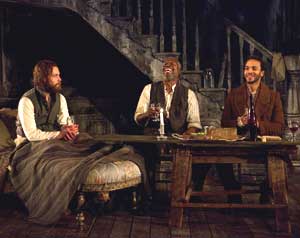
Jews love seeing plays about Jews. Black people love seeing plays about black people. Neither group gets to see themselves
portrayed in the arts or media enough. But if there’s one thing you don’t see often, it’s black slaves holding
a seder.
Starring the eminently talented
actor Andre Braugher (pictured in the headshot to the left and in the group shot, dead center), the play also included
a scene in which one character amputates the leg of another right onstage without the benefit of anesthesia, giving me a piercing
new perspective on my ordeal with the splinter. Seriously, I will try to restrain myself from making such a fuss about mere
surface wounds ever again.
Watching it also brought glaringly to mind the fact that you don’t need to delve way back to ancient Egypt to
find incidents of slavery, and that there are far worse horrors to being enslaved than having to wield bricks and mortar.
This is not to say that modern life or parenting are exactly a nice dip in the Nile.
The next
day, after meeting for brunch, we began to wander around again chatting with our son. At 24, he’s a deeply reflective
fellow, one who’s trying to find his way in the world and, like many a young person with artistic ambitions, is sometimes
plagued with self-doubt.
He’s also someone who likes to mull over deep topics and actually appreciates hearing our takes on them,
even though we happen to be his parents. So our conversation soon took a very personal bent. He noted that, as much as he’s
known us his whole life, and that it seems like we’ve discussed virtually everything under the sun, he’s somehow
never gotten our viewpoints on two very significant subjects: money and sex.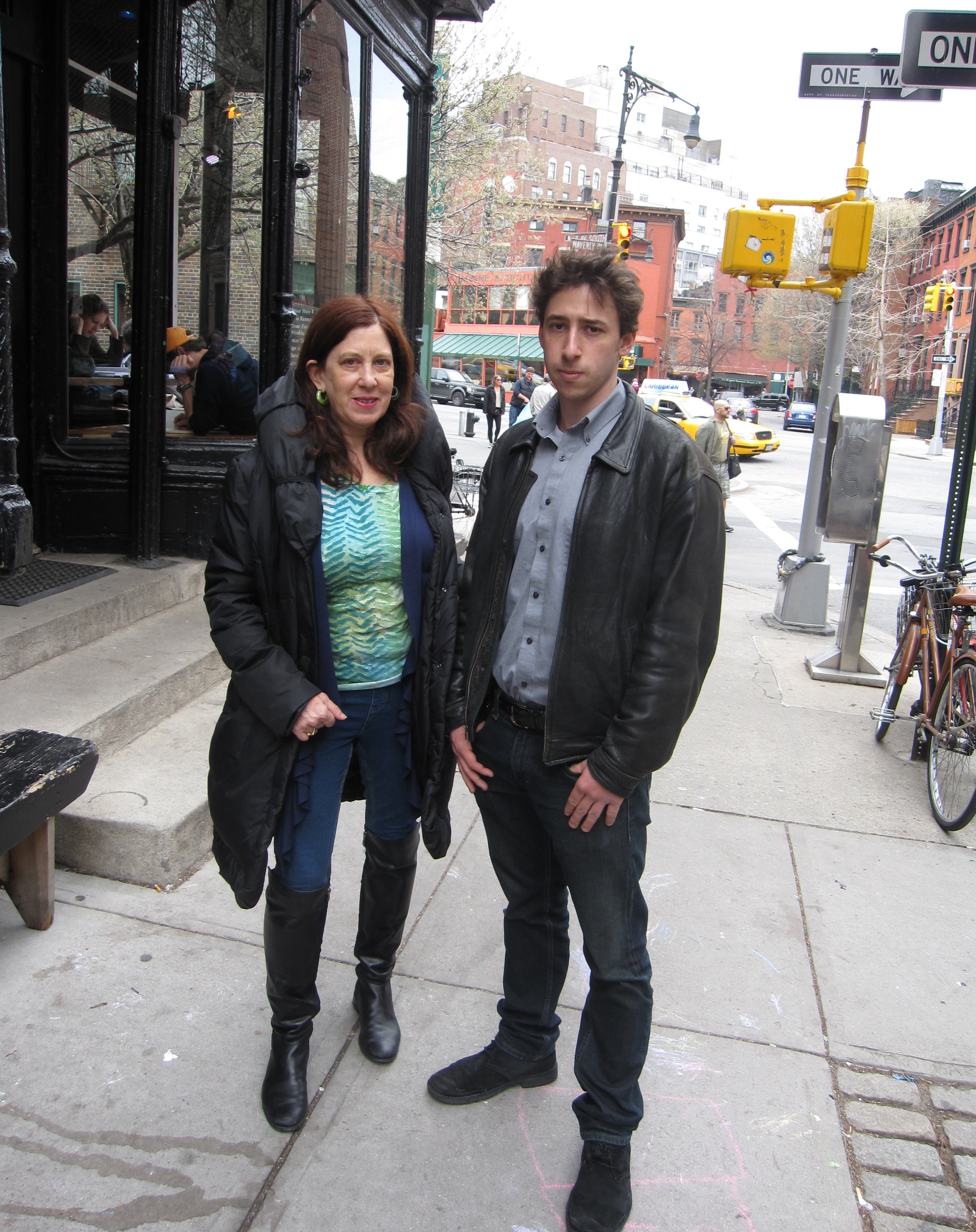
I must admit that I instantly chose the easy route and began to address the former. I noted how, as much as I abhor
extravagance, I think you can take frugality to excess, as I fear he sometimes does. I observed that when people
are going through tough times like these, occasional small splurges – like having lunch out, or ordering a cappuccino
instead of coffee – can brighten life immeasurably.
My husband grew bored of this banter and quickly
shifted to the second issue. But he was far less interested in airing his own attitudes about sex than in drawing our son
out about his. “It all has to do with how you feel about someone,” he noted. “I mean, if you’re with
a girl and she starts to act warm, do you feel like acting warmly toward her, or do you not necessarily begin to act warm?”
“Acting warm,” as if you can’t tell, is some sort of euphemism for kinky things of which my husband
is keenly fond. Me? Not so much.
“Is there any word you could possibly use other than ‘warm’?”
I asked.
“Huh? Why?” he demanded. “What’s wrong with saying ‘warm?’”
I was about to complain about the redundancy, not to mention the "ick" factor. But my son beat me to the
punch.
“It’s just that Mom and are I not warm people,” he replied flatly.
And there, ladies
and gentlemen, you have your tenth plague. You’ve heard of the smiting of the first-born, obviously. But how about having
your first-born smite you?
For all I know, those two guys
proceeded to wander around Greenwich Village discussing all sorts of body temperatures or sexual positions. All I could think
about for the next few days was what my son had just said. Never mind that he had lumped himself in with the insult. (Seriously,
if someone stated that you and she were ugly, or that you were both fat, would that lessen the blow?)
So here's
what I want to know: Do I come across as cold? Am I not a warm mother? Am I not a warm person?
The fact is that I’ve always been on the shy and reserved side, much like my son. When I was coming of age, in
the free-spirited, “Let it all hang out” late ’60s and early ‘70s, “inhibited” was a popular
term, and it fit me to a tee. I was hardly a hugger. I was far from touchy-feely. I felt stiff and self-conscious, and I kept
my hands mostly to myself.
As an adult, I’ve become more outgoing. I’m also prone to give friends a big hug when I see them, particularly
if it’s been awhile. I thought I was also fairly affectionate as a mother. I know that I’m extremely affectionate
with my daughter. But face it -- I think there’s some limit to how physically affectionate you can comfortably be with most
boys. (Yes, I know some people may disagree or be offended by my saying that. Yet I believe it’s true.)
And was his comment strictly about physical displays of affection? I’d like to think I’m a deeply
compassionate person, one who is always there for my friends and family. God and pretty much everyone else knows that I care
about my children beyond words. I talk to them both every day about whatever they wish to discuss and am always ready
to drop everything to listen to them or do absolutely anything for them. Is that not being “warm”?
Before going to New York, I’d spent days assembling a small Care package of special treats to bring to my son,
small tastes of home, taking great pains not to pack so much that he would resent my invading his space, or that
might imply that he can’t take care of himself, because I’ve discerned that those things annoy him. Is that not
being “warm”?
Who
knows? And who knows what he meant? I don’t. Here's what I do know: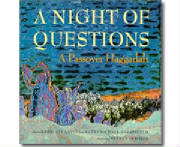
This Passover, we’ll probably be reading from the same Haggadahs we’ve used for years, the ones steeped
in our traditions as well as in decades of ruddy horseradish splotches. (Among those traditions is making sure that my poor
sister-in-law, who is not Jewish, gets stuck reading the passages with the most references to Rabbi Eliezer, Rabbi Eleazar
ben Azaryah, Rabbi Yehoshua, Rabbi Tarfon and all other religious figures with unpronounceable names.)
But I will try to think more about what’s truly important. I will try to be less thin-skinned, the better to keep errant
splinters and unintended wounds out. (I’m sure that my son didn’t mean to hurt me, and if he ever reads this,
I genuinely don’t want him to feel guilty in any way.)
I also will try to make everyone in my family realize
how much I love them and truly treasure this time of year with them. (Toward that end, I must confess that we’re holding
our extended family seder this Sunday night, since that was the only time we could all be together, which means far more to
me than celebrating according to any calendar.)
Plus,
I’ll try to make it apparent to each of my children that they are perfect in my eyes and also eminently worthy of being
loved by anyone whom they choose to love. (And they are welcome to do whatever they choose to do about that, assuming
that all parties involved happen to be feeling “warm.”)
Meanwhile, as
trite as it may sound, I wish everyone in the world freedom in the coming year – freedom from slavery, poverty, pain,
loneliness, sickness and self-doubt. I believe that those are among the most important things, and I wish them to you with
all of my heart.
So, am I getting “warmer”?
12:34 am
Wednesday, April 6, 2011
A
Word From the Weiss
I know what to do with my mother’s mink, my grandmother’s garish
diamond cocktail ring, and the pricey face cream my mother once hoarded as if it were King Midas’s gold. But I don’t
know what to do with the granola.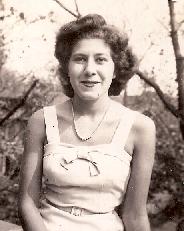
It was exactly two years ago that my mother breathed her last. But forgive me for still forgetting at times
that she’s really, truly gone for good, and for finding it virtually impossible to wrap my mind around that idea. Sure,
everyone’s mother is a seminal, unforgettable figure in their lives. But – trust me – mine was something
more than that: an unstoppable, irresistible force with a big, voluble voice and even bigger personality, both of which made
a lingering if not everlasting impact on almost everyone she met.
April is the cruelest month, and it seems like a strange, cruel coincidence that my mom died yesterday, April
5, the same week that her own mother passed away, only seven years earlier. But it is no coincidence that my brother
Joel and I were by her side in her final moments, as well as for much of her last few months. After all, we’d watched
her care with unrelenting devotion for her own mother throughout her own final years. My mother set an extraordinary example
for me and for us all of what it’s like to be a daughter, son, mother and grandmother… and despite her well-meaning
but often exasperating idiosyncrasies, a mensch.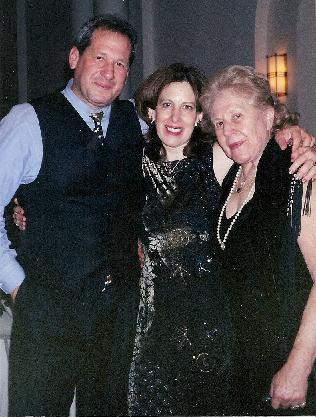
Everyone would like to believe that their own mother is unique and like none other – the best cook, best dressed, most
beautiful… or the most difficult and annoying. (Not that I’m personally insinuating something like that…
necessarily.) But I can assure you that there has never been anyone like Bernice Ann Lichtenstein Weiss Groves – better
known to almost everyone as Bunnie. And there never, ever will be.
So often you hear the expression that someone is not “the
sharpest tool in the shed.” Well, my mother was -- THE sharpest tool in the shed. And she wanted everyone to
know it. Even as her health declined, her mind didn’t falter one iota. Only a few days before she died, although she
had grown extremely weak, she kept opening her eyes to utter random thoughts, from asking who would wear her mink coat to
reminding me to pay her cable bill because it was due on the 31st. But one of her most pointed remarks – aside from
how much she loved her children and grandchildren – was, “Remember that I was in Mensa and ‘that world organization.’”
The latter was a reference to the fact that she had been listed for many years in the books “Who’s Who in America”
and “Who’s Who in the World,” and she wanted to make sure I mentioned that in her eulogy. So I’m telling
you now, before I forget: My mother was in Mensa and “Who’s Who.”
My father owned a company that sold stainless steel.
My mother was a teacher, but her real stock in trade was having a mind like a steel trap.
Or, as she noted in another final thought that she
insisted we relay to our kids, “I want you to know that you’re all brilliant because of me!”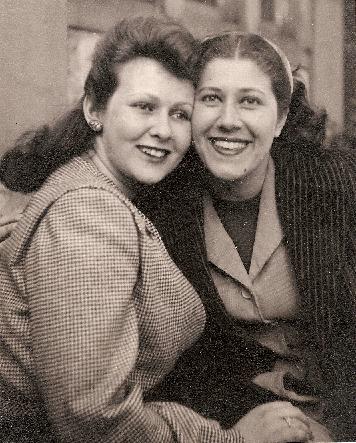
If
you find that statement a bit immodest, try to bear in mind how my mother was raised. The second of two children born to Charles
and Mary Lichtenstein, she grew up in Brooklyn, New York, in the shadow of her older, bigger and extremely bossy sister.
Wars
often break out between adjacent countries when there aren’t enough resources to go around. So began a lifelong rivalry
between the Lichtenstein sisters.
My mother, throughout her life, believed that her sister was overtly favored by their mother. There’s
no question that my aunt was widely admired for her looks. Despite an ongoing battle with the bulge, glamorous Gloria
was considered quite a beauty. My mother was better known for her brains, not exactly a priority for women in her day.
My aunt
was pampered with stylish new clothes and lessons in everything from piano to elocution. My mother made do with a cousin’s
hand-me-downs and was permitted none of these privileges. For her, she always heard, there was no money left.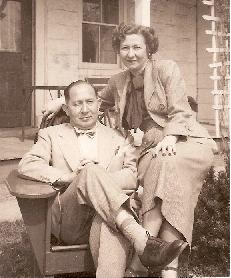
Once,
following a heated marital moment, my grandfather divulged to my mother that Grandma Mary hadn’t actually wanted to
have a second child. “Accident” -- that was one word of advice my mother never forgot. The saving grace to this
Cinderella story was that she also sensed that she was her father’s favorite. And that meant a lot. Despite this one
unfortunate indiscretion, my Grandpa Charlie was a kind, caring and brilliant man. A scholar who shunned the family business
– he refused to become a rabbi, like his father and brothers before him – he chose to eke out a living selling
insurance, which provided sparsely for his wife and daughters but allowed him plenty of time to read. To us, he would have
been the family’s patron saint, if Jews had saints. Instead, my mother referred to him with reverence, using her highest
form of praise: “He was THE BEST OF ALL THE GOOD ONES.”
My grandfather instilled in her a lifelong love for learning, and
a pride in her keen intellect. If you couple this with the sense of inadequacy she got from her mother,
it’s understandable why she was given to frequent self-aggrandizing outbursts like, “I’m so smart! I’m
so brilliant!” whenever she came up with the right answer or found someone’s missing keys, or managed to divine
the solution to one of life’s other little dilemmas.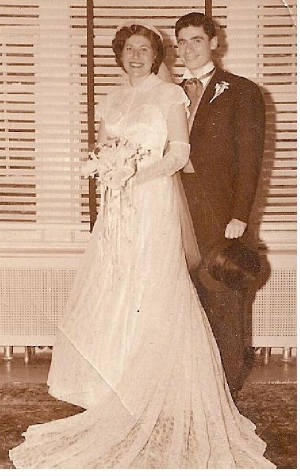
So
I was surprised when she finally admitted one day that she was, in fact, not the smartest girl at New Utrecht High in Boro
Park, as she’d often claimed. Although my mother was the president of Arista, the student honor society, Jeannie Fierstein
was actually No. 1 in her class, “and I was right next to her,” she confessed.
Jeannie married my father’s best friend Joe,
and my mother married my dad, on June 5, 1949, only days after they graduated from college. A marriage made in heaven? Not
quite. My father was obsessively punctual. My mother, chronically late. My father was a fastidious neat freak; my mother pathologically
disorganized, and a pack rat like me. As far as my brother and I could see, they had only one key thing in common: They both
wanted – no, had – to be in control at all times. And so began World War Weiss. Like the Thirty Year
War, it managed to last for nearly three decades, more or less.
But my parents were both intensely private people, so I’d
rather look back now on the nicer moments and occasional entire evenings of calm. Chief among them were summer nights when
I was little and we would drive to Jones Beach, on Long Island, after my father came home from work. My
brother and I would sit in the sand, “digging to China,” and our parents would stretch out contentedly on a beach
blanket nearby, not arguing for once. My mother would have packed us a picnic dinner of her unbelievable, Southern fried chicken,
saucy shrimp cocktail and fudgy homemade chocolate cake. This was, of course, before anyone had even heard the word “cholesterol.”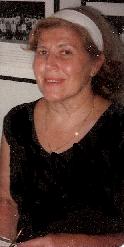
Along
with having a great figure until her later years – although she remained “exquisite and shapely,” by her
own account – my mother was the world’s best Jewish cook. I used to believe that my parents’ turbulent marriage
would have ended much earlier had it not been for her lamb chops. Of course, if she were cooking, just lamb chops would hardly
have been enough. If four people were coming to dinner, she’d prepare enough for 20. She also would have roasted a couple
of chickens, in case someone wasn’t in the mood for lamb, and she’d bake potatoes but also make rice, in case
someone didn’t feel like potatoes. Plus there’d be at least four vegetables and three desserts. Then again, the
one thing we loved best – and I fear I’ll never be able to recreate, although I have the recipe – was
her famous mushroom barley soup.
Most of her other specialties I have down pat. For after my parents split and my brother left for college, my mother
and I spent years together. I served as her confidante. She was my biggest fan and the person most responsible for my
becoming a writer.
For one thing, she was given to an irrepressible, almost manic optimism, despite her often-grim marital circumstances.
She saw everything in the most positive light possible. In response, I viewed the world through the opposite of rose-colored
glasses. My lenses were tinted black. I strove to see things with fierce objectivity, exactly as they were, not as they might
be once in a blue moon, or if the Messiah dropped by. Just to be safe, I generally erred on the side of negativity. It was
the perfect perspective for a journalist.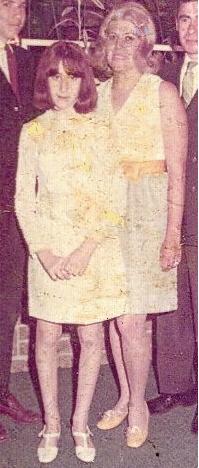
Also,
I had a tendency from an early age to turn any experience, be it a day at school or a trip to the market, into a novella.
My mother didn’t have the patience for it. After about 10 seconds, she’d blurt out, “Just get to the point!”
So now I have all of these stories saved up to tell. (Don’t worry, though. I’m not going to tell them all now.)
My mother’s
mind worked so quickly that she, in turn, developed a prototypically Jewish habit of trying to beat everyone to the punch
line by finishing their sentences for them. This was not a matter of being so in tune with others that she could readily intuit
their mental direction. Quite the opposite. Never once, I’d wager, did she complete a single sentence for me with anything
CLOSE to what I’d been planning to say. I might begin, “I really feel like…” and she’d quickly
interject “Chinese food?” when I’d actually been about to say, “changing my name and joining the witness
protection program."
Of course, for her grandchildren she had infinite patience, not to mention affection. She was so close to my kids that she
was privy to every detail of their lives and knew all of their friends, many of whom also called her Grandma Bunnie. She visited
us frequently in Connecticut, and often joined us for trips to New York City, Boston or a country inn we loved in the Berkshires,
where she would bunk with one or both of my children (and always insist on getting the saggy cot or pullout sofa so they could
have the better bed).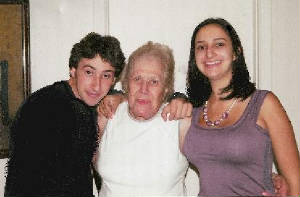
One
of those last trips was to my son Aidan’s college graduation. My mother was incredibly proud of him and convinced that
he was not only smart and brilliant but also destined to be successful in whatever he pursues. Then again, she used the very
last chance they had to chat privately to lecture and grill him about… sex.
So it’s little wonder that she remains very
much alive for him and an ever-present force in his life. “I’ve been thinking about Grandma all day,” he
told me yesterday, even before I’d reminded him that it was, in fact, her yahrzeit, the anniversary of her
death. “Grandma gave the best advice. If I ever needed help with anything, she knew what to say.”
Yet he hadn’t been thinking about her because he needed any particular advice. “I just wanted to talk to
her. Talk to her about everything. I just miss her,” he explained.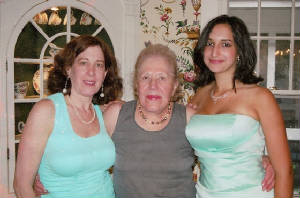
Meanwhile,
in honor of the day, of which she was painfully aware, my daughter Allegra scoured the supermarket for the cheese my mother
always kept in her fridge. “Not that Grandma Bunnie was only cheese to me,” she hastened to add. “She
was just so present to me, in so many insignificant ways…” Without conferring, we also had each purchased
the ingredients to prepare what we refer to as Grandma Bunnie’s Chicken for dinner tonight. Memories just aren’t
enough. We could all use a little taste of Grandma.
I’m heartbroken that my mother won’t get to attend Allegra’s college
graduation next month. As everyone knew, she adored my daughter and rarely missed one of her singing performances. Even after
my mother was diagnosed with breast cancer, she kept assuring me, “Don’t worry, I’ll be at Allegra’s
wedding,” and I’d relax because I believed it was true, even though Allegra was only 15 when she first started
saying this. But the last time that the subject came up, shortly before my mother died, she added the words, “even if
I have to come from heaven,” and I cried because I knew that was true, too.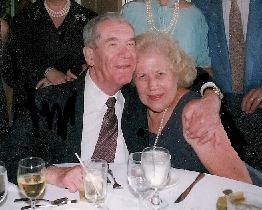
Of
course, beyond being a grandmother, my mother had a very active life of her own. A remedial reading teacher until she was
74, she taught thousands of kids with learning disabilities and other difficulties to read. She also was married for 50 years,
although not all to the same man. She spent the last 20 of those with my stepfather, Sid – quite happily. Unlike my
father, he let her have the one thing she needed most: her own way. But that’s not the only reason she adored
him. She was such a resilient person that after he died, I often joked that her idea of mourning was wearing black tennis
clothes. But the truth is that when he was gone, she began driving around with a photograph of Sid next to her on the
passenger seat. She just wanted to be with him always.
After he died, though, nine years before her, she also found countless ways to keep
busy. She played tennis, did yoga, and belonged to two book groups, as well as – did I mention it yet? – Mensa.
She ran a group at her temple called the MT Nesters, for which she was always organizing Shabbat dinners and other events.
And after she met Bud, a retired surgeon, she became proficient at bridge, like him, playing almost daily.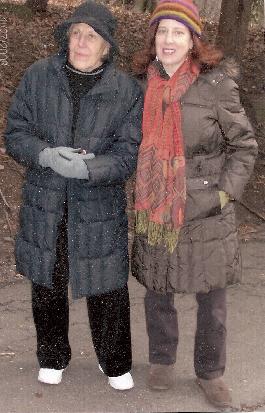
She
remained so lively and upbeat that she didn’t want anyone to know she’d fallen ill. Instead, she continued to
believe that she would soon recover and return to the many activities she loved. She was a lot like Scarlett O’Hara,
the heroine of her favorite movie, who concluded despite countless calamities, “After all, tomorrow is another day!"
It’s
a bit of a conundrum that just when you need to prepare to let go of a parent, such an integral person in your life, your
life begins to revolve completely around theirs. During the time that she was ill, I visited my mother weekly, took her to
most doctor’s appointments and procedures, and often lived with her for a week or more at a time. And whenever I wasn’t
there, I called her countless times a day.
Once, when I stayed over to take her for chemo early, she bought a large bag of fancy granola she’d found
on sale for my breakfast. I ate some so enthusiastically that she insisted on sending the rest home with
me. Then, when I came a week later, she bought me another bag. And so on. I begged her to stop, saying I couldn’t keep
up with her pace. But she didn’t stop.
I still have three bags of this left in my cupboard, now well past its sell-by date. Somehow, I can’t get myself
to eat it. But neither can I bear to throw it away.
I’m not convinced that granola ever expires. It’s just that it evokes memories
of too painful a time. It also reminds me of how persistent she could be. And how, as much as I loved her, and agonized over
her decline, I still found her almost as irritating as ever.
One thing that never failed to annoy me was that, starting when
I was around 40, she began to give me expensive face cream as a gift for every conceivable occasion – my birthday, Mother’s
Day (although she was my mother) – or sometimes for no occasion at all. The subtext to me, despite the sweet
things she’d scrawl on the card, was that I wasn’t quite the beautiful daughter that she said I was, or my alleged
beauty was fading fast.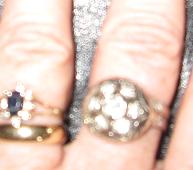
Then
one day, a few months before she died, she called up sounding triumphant. The bad news was that Estée Lauder was discontinuing
this product in favor of a new formula. The good news was that she’d scored the last six jars at Bloomingdale’s.
“Three for you and three for me!” she declared. “Now you don’t have to use it sparingly.”
All I
can tell you is that I’m still using the stuff, but now very sparingly. Two years after she left us, I’m
down to my last jar and a half. Smearing it on makes me feel loved, and like my mother is still here taking care of me (which
is all that she was trying to do all along). But I don’t dare use it every day; I'm conscious that there won’t
be any more of it coming my way.
What I do make sure to do almost every day is to put on something of hers – a sweater, some earrings, a
small onyx-and-silver pendant she wore on a silver chain. The mink, though, I’ve relegated to Allegra. It looks better
on her, and I’m not a fan of fur. I’ve decided it was destined to skip a generation -- like the upbeat personality
gene.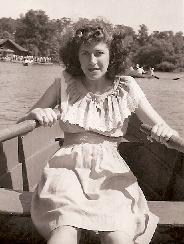
Then
there’s that diamond cocktail ring. I always thought it was a little gaudy when she wore it; certainly too glitzy for
my taste. I put it on one day last year, though, and have yet to take it off. Wearing her things makes me feel like I’m
taking her along for the ride. So one way or another, my mom’s going to be at that graduation, after all.
Tomorrow will
be another day. But sadly for us all, it will be yet another day, and the start of another year, without my mother. Like Aidan
and Allegra, I miss her terribly.
She was an unstoppable force. She was an exceptional woman, mother, grandmother, and mother-in-law. She was
the sharpest tool in anyone’s shed.
She was THE BEST OF ALL THE GOOD ONES.
9:59 am
|
|
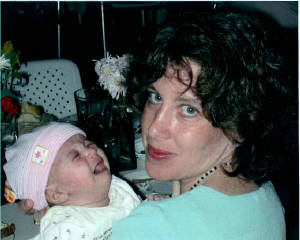
|
| That's me. The redhead on the right. But that is NOT my baby. |
No, sir, that's not
my baby. How could any mother smile beatifically while her own child wailed? Never mind that neither of my offspring
ever cried so plaintively, as far as I recall (not while I was there to nurture them through their every perceptible
need... although my son still complains that I often dressed him in garish and girlish color schemes, scarring him FOR LIFE). Besides, I'm distinctly beyond prime
delivery age ("Kitchen's closed!" as my mother might say), and my kids had departed the diaper stage by the
dawn of the Clinton Administration. Now in
their 20s, both are currently living on their
own, in not-too-distant cities, although each manages to phone me daily. In fact, to be exact, several times a
day, then sometimes text me, too. (That may sound excessive, and emotionally regressive, but I subscribe to
the Jewish mother's creed when it comes to conversing with kinder: Too much is never enough.)
Two demanding decades spent raising two kids who are kind, highly productive and multi-talented, who generally
wear clean underwear (as far as I can tell), and who by all visible signs don't detest me are my main credentials
for daring to dole out advice in the motherhood department.
Presenting myself as an authority on all matters Jewish may be trickier to justify. Yes, I was raised Jewish and am biologically an unadulterated, undisputable, purebred Yiddisheh
mama. I'm known for making a melt-in-your-mouth brisket, not to mention the world's airiest matzah
balls this side of Brooklyn. My longtime avocation is writing lyrics for Purim shpiels based on popular Broadway productions,
from "South Pers-cific" to "The Zion Queen." Then again, I'm no rabbi or Talmudic scholar. I
can't even sing "Hatikvah" or recite the Birkat Hamazon. Raised resoundingly Reform, I don't keep kosher, can
barely curse in Yiddish, and haven't set foot in Israel since I was a zaftig teen. Even so, as a longtime writer and ever-active
mother, I think I have something to say about being Jewish and a mom in these manic and maternally challenging
times. I hope something I say means something to you. Welcome to my nice Jewish world!
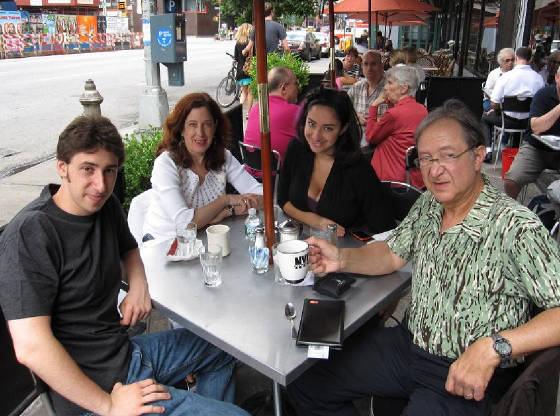
|
| LEVYS! MEET THE LEVYS! WE'RE A MODERN JEWISH FAMILY... |
In coming weeks, I will continue
posting more personal observations, rants, and even recipes (Jewish and otherwise). So keep reading, come back often,
and please tell all of your friends, Facebook buddies, and everyone else you know that NiceJewishMom.com is THE BOMB!
********************************************* The family that eats together (and maybe even Tweets together):
That's my son Aidan, me, my daughter Allegra, and Harlan, my husband for more than 26 years, all out for Sunday brunch on a nice summer weekend in New
York.

|